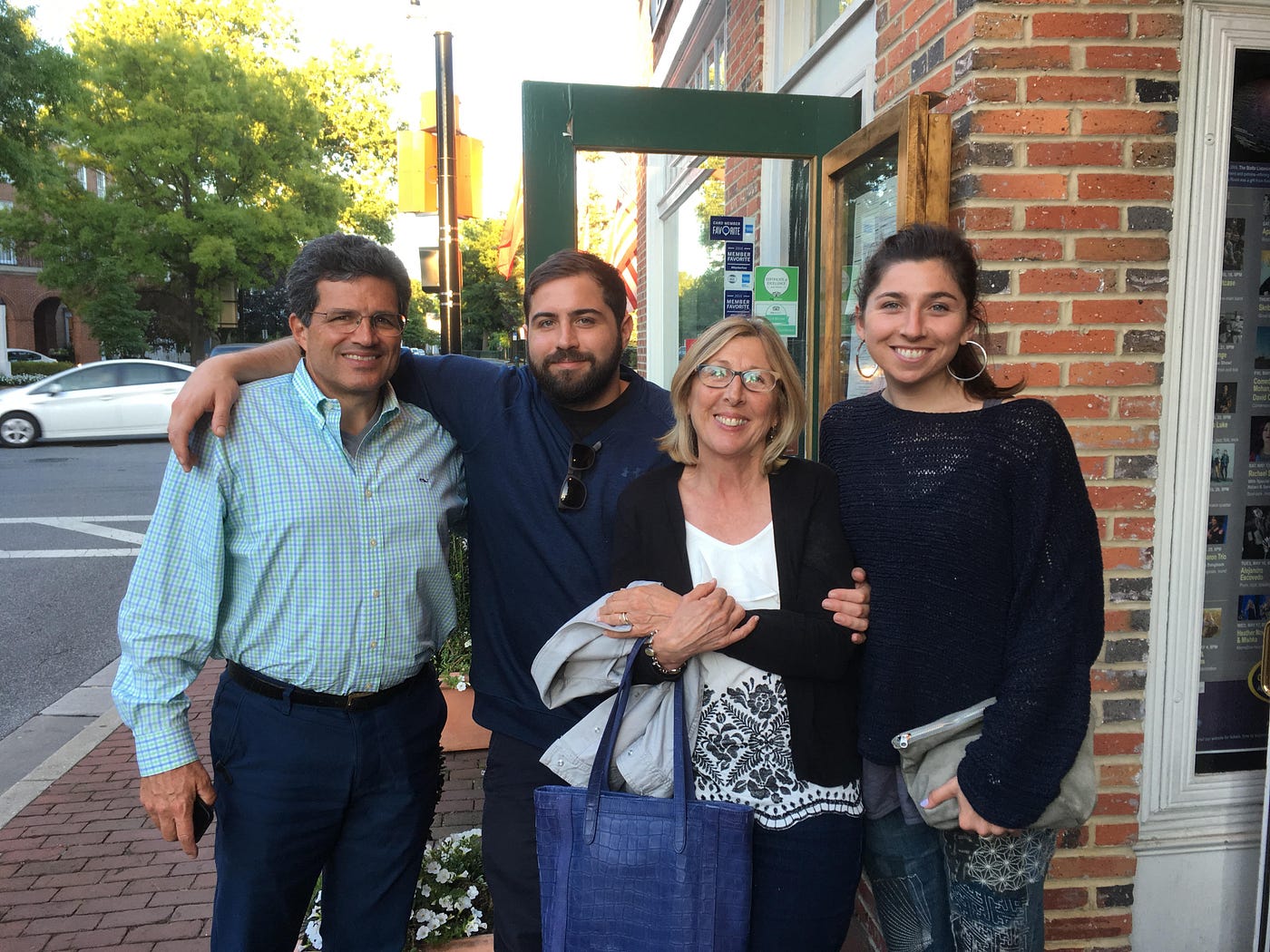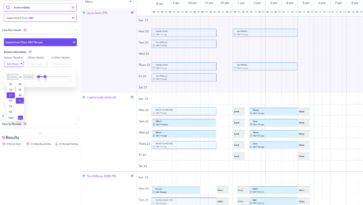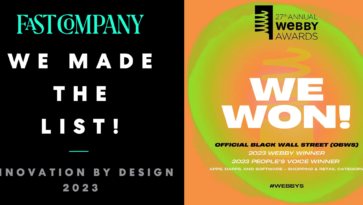Zoë is an Associate Product Manager who joined Sidebench this past fall.
Where did you grow up and what was it like?
I grew up in Baltimore, MD in a neighborhood with a lot of kids my age. I was really lucky to be in a place where I could play outside, walk to my school and have access to other public spaces. I was a really active kid. In the neighborhood we played everything from capture the flag to lava monsters to flash-light tag to just riding around on our bikes or roller blades. I also played organized sports like soccer, lacrosse and ran track. Keeping active is a habit I learned early and am super grateful for that.
I have a tight knit family and was taught from a young age the importance of making intentional time to be with family — both immediate (I grew up with my mom, dad and older brother) and our big extended family (I am one of 13 cousins on my mom’s side and my dad’s side, while small, is super close). While they all live all over the country, I was so lucky to visit them and form such close relationships with them.
Outside of work, what are you irrationally passionate about?
Music! I don’t play any instruments myself anymore (just violin in middle school — I really hated practicing though because it meant sitting down for hours and all I wanted to do was run around outside) BUT I have such a deep appreciation for music and those that create it. My parents are big music buffs so I was exposed to a lot of different music from an early age and we always had the local radio station on in our house. Thus, I always have music playing — when working, reading, creating art, driving in the car, etc. — and love seeing live music (from big arenas to open mics and everything in between). When I was living in NYC, I was introduced to Sofar Sounds which is an organization that hosts secret concerts in intimate spaces around the world. I loved the fact that I would go to a concert in a random part of the city and see three artists who I had never heard before that night, all the while being surrounded by other people that love and appreciate music of all genres and styles. When I moved to Baltimore for graduate school, I joined the Baltimore team as an ambassador and loved doing everything from emcee to social media to artist liaison to check in and everything in between. I am in my happiest place when listening to live music with other people.
It’s rather common that PMs have uncommon paths into the discipline. Walk us through the process that you went through to get into Product.
Definitely a twisting, winding road but, my guiding light through it all has been my core values: Leadership, Courage, Growth and Relationships. I find that if I am being led by my values, I end up where I am meant to be. Now, of course, during times of transitions and when at the edge of the unknown (like right before I got to Sidebench), it is definitely scary to head into that space without being sure of what is on the other side of it. For me, I’ve found that the way I push through that is when the “fear of not trying and staying in the same place” outweighs the “fear of trying and failing.” That’s been a core theme throughout the many career transitions — or rather evolutions — I’ve had in my life.
Before working in Product, I worked with and for a variety of non-profits doing program development and events work. Starting in college, I became passionate about connecting people with causes and initiatives that they care about to create a positive social impact in various corners of society. I worked in refugee resettlement, community engagement for the Baltimore Ravens, healthy relationship behavior education for youth across the country and public library programming on a Bookmobile. As I look back, it’s easy to see the common thread of community service but I was always delivering a service or program, not a product. It wasn’t until I was in graduate school for Interaction Design and Information Architecture that I started to build that bridge between those two worlds.
During my degree, I was designing digital experiences and found myself drawn to project roles in which I was leading teams of designers and researchers through complex problem solving. I was introduced to product management after graduation and was drawn to the interdisciplinary servant leadership aspect of the field.
Continually curious and always up for a challenge, I am excited for this journey into product.
We talk a lot about our jobs being the opportunity to imagine the future and then make it real. What vision do you have for the future and want to make real?
A vision for the future I want to make real is more equitable access to digital information and technology. As one of the wealthiest and technologically advanced countries in the world, the digital divide is staggering. We saw just how wide this chasm was during COVID, and as a youth librarian at the time, I saw how many children and families were struggling with remote learning and work when they didn’t have access to the hardware, software and or internet. This is a complex interconnected societal issue that I am eager to explore and help solve alongside communities. There are amazing organizations and initiatives out there working hard to shine the spotlight on the divide and demanding our country rethink about access to information and technology. My goal by working in product is to continue to learn about this issue and push myself and others to approach product from a place of equity.

Not everything we do works and that’s okay. We learn from those things. What is the least successful product or project you’ve contributed to and what did you learn? (No need to mention real names if it’s an issue)
In graduate school I was in an intensive summer research class where we were conducting mixed-methods research project. We were a pretty large research team and had a couple of days of participant usability testing. The data we were collecting was a little complicated to keep track of because of the technology we had which required some back-end coding to ensure that we could keep track of which participant did what. There were a couple of computers we were using, all of which needed to be prepped each day in order to keep track. When it came time to review the data at the end of the study, we discovered that not all of the data had been tagged properly, making it impossible to decipher which data points were whose across the usability tasks. We had all worked really hard throughout the research process and it was very tough to have to say that we couldn’t use the data.
I saw first hand the immense amount of responsibility that comes with research and reporting findings. If your data is compromised, unfortunately, it doesn’t matter how hard you worked to get it, or the resources you’ve used, it is your ethical responsibility to be honest.
I also learned the importance of alignment and thoroughness when working with a large team with several moving parts. To avoid a diffusion of responsibility or making assumptions, I’ve found that communicating early and often helps mitigate risk.
How has a failure, or apparent failure, set you up for later success? Do you have a “favorite failure” of yours?” (Borrowed from Tim Ferris’ “Tribe of Mentors”)
A favorite failure…well at the time I viewed this as a failure. I played Division 1 lacrosse and rarely saw playing time throughout my 4 years. I was a starter and captain in high school and when I got to college I quickly realized that my physical lacrosse skills were not at the level that our team needed. I felt like a failure. If I wasn’t contributing on gameday, what was my purpose on the team? How could I add value? A big part of me feeling like a failure was due to my one-dimensional view of leadership. Really, my failure was not recognizing that leadership is deeper than the number of goals you score or defensive blocks you make. I thought that in order to lead my team and gain their respect, I needed to be on the field on game day. But over the 4 years, I learned from my teammates, coaches and from other athletes that leadership is a verb and a skil.
By the end of my 4 years, I was leading community service projects for my team and the athletic department (we were awarded a top community service award) and my senior year I was awarded the Leader of Distinction honor by my teammates and coaches. And my junior year, when we won the first National Championship in our program’s history, and I didn’t see a second of playing time, I still felt that that win was equally all of ours. To this day, I am so proud of how I turned that “failure” of not playing into a success for both myself and for my teammates, helping others find and utilize their unique leadership skills, whether that’s on or off the field.
What’s been the most exciting part about joining Sidebench so far?
The most exciting part has been getting to know this incredible team of bright, creative, empathetic and diverse individuals. From the moment I started (well really during the recruiting process!) I saw how much the team saw value in unique and diverse perspectives. It is those that help us each grow as individuals and a team, to truly challenge inertia and build a brighter future. I feel empowered to be myself, to use my voice, to listen to others, to try, fail and try again. Especially with being new in the Product space, I appreciate the opportunity to be surrounded by teammates who want to help me learn and succeed.
Additionally, it’s been so exciting to learn about the variety of partners we work with and how the products we help discover, design, build and deliver are helping to make the world a healthier place. I’m excited for the opportunity to be part of such a mission-driven organization.

We love to find people that ADD to our culture vs fit into our existing culture. What are some cultural aspects that you’ve experienced that you hope to bring with you?
I’ve learned so much from playing sports and am so thankful for my parents taking me to practices, games and encouraging me to stick with sports even when they got really really hard. Two of the biggest lessons from playing team sports that have radically changed the way I approach complex problems are:
- Doing the little things consistently well leads to big wins.
- Everyone plays a crucial role on the team, taking pride in your role and respecting other’s roles leads to strong team chemistry and trust.
I carry these guiding principles with me and approach situations with a team-mentality. We are social beings, we are better when we work smarter — and more empathetically — together. I hope to continue to be both a team leader and cheerleader, make sure I am doing the little things well and take pride in whatever role I play, empowering others to also embrace their unique roles.
Describe your super power or describe what unique skill/perspective you bring to the team here.
My unique perspective comes from my time conducting academic research about and working with children. A child’s unique and creative view of the world is something that we all had at one point in our lives but is impossible for us to truly recreate now as adults. When I was working with children, I was reminded of that child-like wonder, the bravery of trying something new and the power of play. I try to harness that in my day to day, bringing a sense of play, creativity and curiosity into my work. And when things get tough or I get stuck in a problem I’m trying to solve, I remember that sometimes I just need to take off my adult high heels and put on my light-up kid sneakers.
What skill, practice, behavior, hobby or habits are you currently working on?
A friend shared this piece of advice from Brené Brown’s vulnerability, leadership and shame research with me a couple of years ago: “Clear is Kind. Unclear is unkind.” The idea is that when we are clear with our communication and our intentions with others, we are giving others the gift of trust and respect. There have been times in my life where I haven’t been clear about how I really felt or communicating the whole story out of fear that I was going to hurt the person on the receiving end. What I didn’t realize was that by doing that, I was unintentionally signaling to the receiver that I don’t trust that they can handle my feedback, opinion, etc. By skirting around the topic or not really saying what I meant, I was avoiding a tough and potentially awkward situation but I was also avoiding the truth and a chance at solving the problem. I recognized that by being unclear, I was moving farther away from my values of integrity and courage.
This piece of advice applies to all facets of life and I am continually working on being clear with others and hope that they offer me that same kindness.
Bonus Question: What book, publication, or podcast have you most recommended lately and why?
I’ve recommended “The Defining Decade: Why your twenties matter — and how to make the most of them now” by Dr. Meg Jay so many times I’ve lost count. It was recommended to me in my mid-twenties by a friend when I was really struggling with which direction in life I wanted to go and felt “stuck.” This book really helped me reframe my thinking and helped me understand that by sitting in my discontent and frustration with the uncertainty of the future and not making any concrete decisions is a decision in and of itself. When I would go back and forth between career paths, places to live, graduate school programs, etc. but not actually putting a stake in the ground, I was essentially hoping that things would just magically turn around for me and would happen without doing anything different to put those plans into motion. Similar to the mantra my lacrosse coach would tell us: “If you do what you’ve always done, you’ll get what you’ve always gotten.”
The book taught me to break down my big dreams into smaller tangible bits. It’s what motivated me to take the risk of leaving my job, NYC, my friends and move back home and apply for graduate school in a program that I didn’t know too much about but had a good hunch that it would get me to the place I wanted to be one day. With that, I want to acknowledge that I had the privilege of mobility, family support and monetary means to make these choices. I recognize that it takes more than a book to be able to make these big life shifts. But I do think the underlying sentiment of the book is one worth exploring, especially at such a critical period of our lives that is the 20s. That our 20s is a time for meaningful and purposeful exploration.









